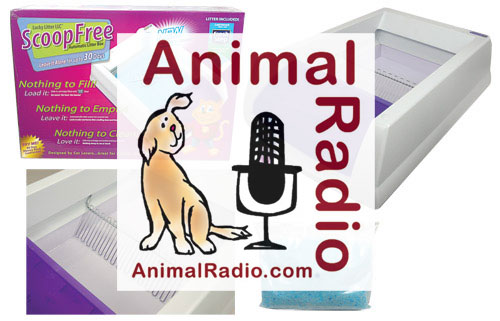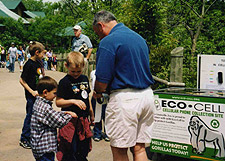Katherine Grier, Pets in America
LITTER-PALOOZA 2006
![]() The History
of Cat Litter
The History
of Cat Litter
Katherine Grier, Pets in America
 Mr. Edward Lowe created kitty litter in 1947 after
his neighbor, Kay Draper, asked him if he had any ideas on what
to use for her cat instead of sand. At the time he was working
for his father selling industrial absorbents and an absorbent
clay called Fuller's Earth, which was used for greasy spills.
While people were using things such as sand, cinder ashes from
the fireplace and even wood shavings, Mr. Lowe suggested she try
Fuller's Earth. She did and she was sold!
Mr. Edward Lowe created kitty litter in 1947 after
his neighbor, Kay Draper, asked him if he had any ideas on what
to use for her cat instead of sand. At the time he was working
for his father selling industrial absorbents and an absorbent
clay called Fuller's Earth, which was used for greasy spills.
While people were using things such as sand, cinder ashes from
the fireplace and even wood shavings, Mr. Lowe suggested she try
Fuller's Earth. She did and she was sold!
 Edward his the road with his
new kitty litter in 1950, taking it to cat shows and pet stores.
He had to convince store owners to carry his product, and even
agreed to giving his product away to potential customers. Mr.
Lowe was very creative. At cats shows he would clean litter boxes
in exchange for booth space to display his litter.
Edward his the road with his
new kitty litter in 1950, taking it to cat shows and pet stores.
He had to convince store owners to carry his product, and even
agreed to giving his product away to potential customers. Mr.
Lowe was very creative. At cats shows he would clean litter boxes
in exchange for booth space to display his litter.
Eventually Mr. Lowe founded his own company, Edward Lowe Industries,
to make and distribute his kitty litter. He even created the
Tidy Cat kitty litter in 1964.
The first clumping litter was invented by Thomas Nelson in 1984.
http://www.PetsInAmerica.org
Reasons Why Your Can't Won't Use the
Litter Box
Vicky Halls, Cat Behavior Specialist
 If your cat won't use his litter
box you need to go back to the basics. Just because you picked
out the litter, as well as picking out the location, doesn't mean
that your cat will agree. Sometimes they want their box placed
in a more private location, or may just want the cover removed.
If your cat won't use his litter
box you need to go back to the basics. Just because you picked
out the litter, as well as picking out the location, doesn't mean
that your cat will agree. Sometimes they want their box placed
in a more private location, or may just want the cover removed.
If you cat has always used his litter but now goes besides the box, perhaps he never liked it in the first place and sudden stress, brought on by any changes in the household, have made him decide that he isn't going to tolerate it any more.
You may also find litter problems with cats that have been declawed. Because their claws and "knuckles" have been removed, it can sometimes be painful to use litter. You may find these cats urinating in smooth places, such as a sink or bathtub, where they don't have to scratch any litter.
Spraying is different from using a litter box. Both females and males, spayed and neutered cats can spray. Spraying is the process where they stand up, tail quivering, and squirt a small amount of urine on a surface such as a wall. If the urine seems excessive and runs down the wall into a puddle, there is something else going on. He might be uncomfortable urinating. When this happens, take him to the vet to rule out any medical problems.
The rule of thumb is one plus one
which means if you have two cats, then you should have three litter
boxes. And if there is a change in your cat's litter habits
take him for a checkup to rule out any medical problems.
http://www.VickyHalls.net
SCOOP FREE Automatic Self-Cleaning
Litter Box
 Alan Cook, Lucky Litter, LLC
Alan Cook, Lucky Litter, LLC
Can you imagine, a self-cleaning litter box that you can leave
alone for 30 days? That's a whole month of no "poop scooping!"
The ScoopFree Automatic Self-Cleaning litter box uses disposable
no-mess litter cartridges that are pre-loaded with Fresh Step®
brand crystals. You simply replace the cartridge about once a
month for each cat. That's it! The built-in waste trap is covered,
so when you remove the cartridge you only touch clean and sanitary
surfaces.
Wonder how the ScoopFree fits 30 days worth of waste in a little waste trap? Since the crystal litter does not clump, leaving no clumps of urine, the waste trap does not fill up as quickly as other automatic litters do. In fact, the crystals shrink the poop! So because of this, the trap holds a lot of waster since there are no clumps and the solids shrink over time.
The ScoopFree Automatic Self-Cleaning
litter box is also reliable and whisper quiet. ScoopFree is 10
to 15 decibels quieter than other leading automatic boxes, operating
without disturbing cats or people. So stop "scooping the
poop!"
http://www.ScoopFree.com
Does Your Dog Ignore You?
Britt Savage
Does he just sit there when you call his name? Well there's a
possibility he doesn't know his name! It seems obvious, but
it's not when you think that both of you speak a different language.
And a lot of the time, owners combine the dog's name with a command,
leaving the dog to think his name could possibly be "Toby,
get out of that garbage right now!" Experts say dog training
for names should start when you first bring the dog home, but
it's never too late. Teach your dog his name by saying his name
and giving him a treat or a toy. His name should always be a
positive thing, and experts advise not combing the name when reprimanding
him. Within a week you should get the respect you've been missing
a very attentive dog!
Dogs Smell Cancer
Dr. Jim Humphries, Veterinary
News Network
The California study was conducted by the Pine Street Foundation
and will be published in integrative cancer studies. It shows
that five dogs were 88% to 97% accurate in smelling several types
of cancers in breath samples. Dogs may be able to give doctors
clues about chemical markers that have not yet been discovered.
The knowledge that dogs can detect cancer was initially established
in 1989 when a pet's repeated sniffing of its owner's skin lesion
prompted a cancer diagnosis. Four cancer studies using volunteer
dogs from around the country are about to begin. The studies
will focus on prostate, mammary, lung and ovarian cancers. Researchers
estimate that for accurate results, studies must use at least
108,000 original samples and be precisely staged.
http://www.VetNewsNet.com
Fourth of July and Animals Don't Mix
Dr. Jyl Rubin
 Most animals are afraid of the
loud noises, smoke and other sounds that come from fireworks.
It is best to keep your pet indoors during the fireworks. You
can also place cotton balls in the ears of your pet and play smoothing
music for them. And if you have a bird, don't leave the windows
open, those smoke bombs can get into your house, which is bad
for birds.
Most animals are afraid of the
loud noises, smoke and other sounds that come from fireworks.
It is best to keep your pet indoors during the fireworks. You
can also place cotton balls in the ears of your pet and play smoothing
music for them. And if you have a bird, don't leave the windows
open, those smoke bombs can get into your house, which is bad
for birds.
If your pet gets really stressed out try
using Comfort Zone with Feliway for cats or Comfort Zone with
D.A.P. for dogs. These are plugs ins that you put in the room
which has a calming effect for your pets. Even the most calmest
animal can become fearful and run away on the 4th of July. Remember
to always have an identification system on your pet. Hear Dr.
Jyl offer excellent advice on pets and the 4th of July.
http://www.DrJyl.com
Litter Box Lessons
Arden Moore, Special Correspondent
 A recent national survey showed
that about 2/3 of cat owners have problems with their litter,
whether it is the smell or mess.
A recent national survey showed
that about 2/3 of cat owners have problems with their litter,
whether it is the smell or mess.
DO'S
Clean the box on a daily basis
Provide one box plus one (if you have two cats you will need 3
litter boxes)
Pay attention to the kind of litter you use just because
you like it doesn't mean your cat will
Use a fine granule clumping litter
DON'TS
Don't use a perfumed litter
Try not to use covered boxes it traps the smell and most
cats don't like them
Do not place the box in a high traffic area
A lot of what type of litter you use and the box you use will depend on your cat. Just like people, cats are individuals and what may work for one, will not necessarily work for another.
Another choice you have is to toilet train your cat. But remember if you do this, make sure your cat will still use a litter box. This will come in handy if you have to board your cat or if you travel with him. Can you imagine being at a rest stop and someone brings their cat into the "loo"?
Arden Moore is the editor of Catnip Magazine,
which is a monthly issue through Tufts University. There are
no advertisers it is sort of like consumer reports for cats.
Everything is reviewed by the advisers of Tufts, and there are
4 pages of product reviews each month by test cats. To subscribe
visit catnipeditor@tufts.edu .
http://www.ArdenMoore.com
 Mouse
- The Big Cheese
Mouse
- The Big Cheese
Rae Ann Kumelos, Voice of the Animal
From running the happiest kingdom in the world to transporting
grace into the nooks and crannies of our lives, Mouse is very
big in the schemes of mankind.
http://www.VoiceOfTheAnimal.org
Cell-Phone Recycling Which Helps African
Gorillas
Eric Ronay, Eco-Cell
 Eco-Cell is a cell phone recycling
program at 56 zoos across North America. Participating zoos gather
and recycle cell phones and raise awareness for the connection
between cell phones and the habitat of African gorillas.
Eco-Cell is a cell phone recycling
program at 56 zoos across North America. Participating zoos gather
and recycle cell phones and raise awareness for the connection
between cell phones and the habitat of African gorillas.
The habitat of the gorillas has been adversely affected by the production of cell phones since it requires a dull metallic ore known as "Coltan", which is largely found in Eastern areas of the Congo. The mining of this ore occurs in the middle of endangered gorilla and elephant habitat. The U.N. has reported that in the past five years, the eastern lowland gorilla population in the Congo has declined 90%. Reducing the demand for Coltan will help save gorillas and their habitat.
Due to constantly changing technology, the average lifespan for cell phones is 14 months. According to the Environmental Protection Agency (EPA) there are over 500 million broken or unusable cell phones in the U.S. with over 130 million added each year. Less than 2% are recycled. The EPA estimates that this quantity of cell phones is equivalent to about 250,000 tons of toxic material.
ECO-CELL works with over 50 zoos across
North America including the National Zoo, San Diego Zoo, Zoo Atlanta,
Denver Zoo, Philadelphia Zoo, Cleveland Zoo, Phoenix Zoo and Louisville
Zoo. A complete list of participating zoos can be found at their
website. In addition to collection boxes at the participating
zoos, used phones can also be mailed directly to ECO-CELL with
the proceeds being designated for a specific zoo.
http://www.Eco-Cell.org
Litter for Dogs?
Darlene Arden
 Yes, there are litters for dogs!
These are very convenient for the elderly, people living in high
rises, and people who have to deal with the climate such snowstorms.
Back in the older days, people would train their dogs on paper.
Well, now there are new and more convenient systems for dogs.
There are actually litter boxes for dogs that use paper that
has been shaped into large pellets. There are no odors and they
do not track all over the house like cat litter sometimes does.
These pellets are recycled, easy to dispose of, and as cat
litter, you should scoop them out daily and replace fully once
a week. Find out from Darlene how easy is it to train your dog!
Yes, there are litters for dogs!
These are very convenient for the elderly, people living in high
rises, and people who have to deal with the climate such snowstorms.
Back in the older days, people would train their dogs on paper.
Well, now there are new and more convenient systems for dogs.
There are actually litter boxes for dogs that use paper that
has been shaped into large pellets. There are no odors and they
do not track all over the house like cat litter sometimes does.
These pellets are recycled, easy to dispose of, and as cat
litter, you should scoop them out daily and replace fully once
a week. Find out from Darlene how easy is it to train your dog!
![]() Find out
more in Darlene's newest book, Small Dogs Big Hearts.
Find out
more in Darlene's newest book, Small Dogs Big Hearts.
http://www.DarleneArden.com
http://www.DogLitter.com
 Talk
With Your Animals
Talk
With Your Animals
Joy Turner
Joy talks with Chaco, a miniature donkey, who is worried about
getting neutered. He wants to know exactly what is going to happen
during the procedure!
http://www.TalkWithYourAnimals.com
Save the Whales - Make A Song
Patrick Ramage, IFAW
 In a 33 to 32 vote at the International
Whaling Commission meeting in June, the commission backed a statement
that said the whaling ban was no longer necessary and that whales
were responsible for depleting fish stocks, and that non-governmental
organizations, such as the IFAW, were a "threat."
In a 33 to 32 vote at the International
Whaling Commission meeting in June, the commission backed a statement
that said the whaling ban was no longer necessary and that whales
were responsible for depleting fish stocks, and that non-governmental
organizations, such as the IFAW, were a "threat."
The move is devastating to the community who has been fighting to protect the large beautiful whales. The good news is something still can be done about it! The next meeting is in May 2007 in Anchorage Alaska. You can send a letter to President Bush ensuring your stance against whaling is sent to the White House.
 To help
save the whales, you can also create your own song. DJ's both
amateur and pro are invited to make your own Whale Remix by downloading
the humpback whale songs used in the Whale Remix Project, to mash
your own remixes offline. Use your remix skills to create a song
that shows the world how beautiful these gentle giants really
are. You can then enter your song in the IFAW Whale Song Remix
Contest for a chance to wind a 60GB Video iPod! The deadline
is August 30th.
To help
save the whales, you can also create your own song. DJ's both
amateur and pro are invited to make your own Whale Remix by downloading
the humpback whale songs used in the Whale Remix Project, to mash
your own remixes offline. Use your remix skills to create a song
that shows the world how beautiful these gentle giants really
are. You can then enter your song in the IFAW Whale Song Remix
Contest for a chance to wind a 60GB Video iPod! The deadline
is August 30th.
http://www.StopWhaling.com
http://www.IFAW.org
Listen to the 1/2 Hour ABRIDGED VERSION Podcast of this show (#344).
![]() View Animal Radio
Network® Broadcast Schedule in a new window.
View Animal Radio
Network® Broadcast Schedule in a new window.
![]() Listen
to Animal Radio®
- Go to the launch page
Listen
to Animal Radio®
- Go to the launch page
![]() Return to Animal Radio Network®
Home Page
Return to Animal Radio Network®
Home Page
![]() Read June Newsletter
Read June Newsletter